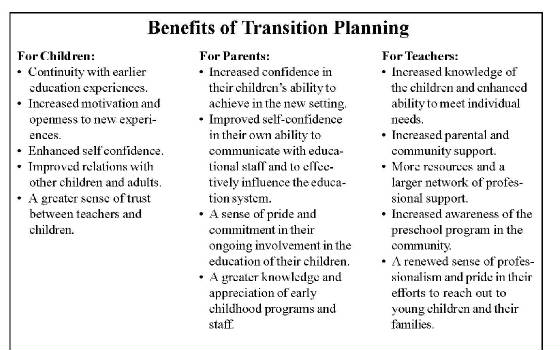|
Transitions occur at many levels, big and small, obvious or subtle. The obvious
transitions such as entering or leaving a program or changing from one program option to another necessarily require planning
and preparation. Other transitions such as developmental changes or moving from one activity to another in the course of a
day also require thoughtful attention, but they can be overlooked because we may not immediately identify them as transitions.
Still, in all cases, transitions are about change, a passage from one experience, stage, or activity to another, and thus,
all demand careful consideration.
The issue of transitions, whether they are big
or small, is a particularly sensitive one for infants and toddlers because of the developmental characteristics that are pronounced
during this age period. Infants and toddlers have a limited framework for understanding change and fewer resources to deal
with stress than older children or adults have. Thus, consistency and continuity play a particularly important role in helping
children successfully manage transitions.
Young children are developing relationships with
parents and teachers as well as learning to trust or distrust the world around them through predictable routines and experiences.
They thrive on routines that teach them what to expect and how to make sense of their world.
They are then able to turn their attention to mastering that world through their play and interactions with others—
reaching out to grasp toys, learning how to roll across the floor to get to that shiny red ball, or pulling up to stand by
mommy’s leg. If life experiences are particularly chaotic in the early years, children can become anxious, they can
have difficulty learning to regulate their behavior and emotions, and their learning and development in all areas may be thwarted.
Ideally, the love and support of a child’s
family is the one sure thing that children can count on in the midst of all transitions, big and small. The research literature
that explores how infants and toddlers develop strong, positive relationships with their parents describes the parent as a
“secure base” that children need to return to over and over as they venture away to test their new skills and
their effect on the world around them. The family is the key to continuity if they can be counted on to provide that safe
and secure base to which a child can always return for comfort and care. For that reason, we must do all we can to empower
families to be involved, make decisions, and advocate for their children. We must also recognize when families are unable
to do so, and take particular care to support children and families to overcome those barriers. All that we do to partner with families and involve them in their child’s education, health, and
early development supports our goal of strengthening the parent-child relationship. Strong, supportive, trusting relationships
between parents and children are the best buffer for the challenges children face as they grow and are a primary component
of planning effective transition services in and out of First Steps.

|

